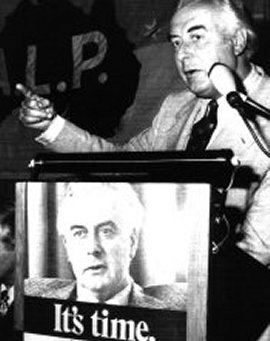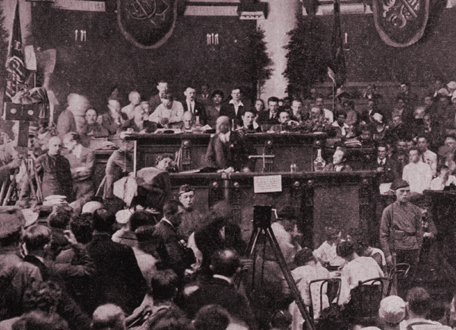`Bishop of the slums' -- Dom Hélder Camara and Brazil's church of the poor

By Barry Healy
July 14, 2009 -- This year marks the centennial of the birth and the tenth anniversary of the death of one of the most significant religious figures of the 20th century, an instigator of the liberation theology trend in Latin American Catholicism and a campaigner against military dictatorship: Dom Hélder Camara.
Dom Hélder could have advanced himself to the position of cardinal and from there, who knows, possibly to the papacy itself. Instead, he stood for democracy in Brazil, despite threats to his life and certainly at the expense of his career. He represented the most extreme point that the Catholic hierarchy could go in standing with the poor in the tumultuous era following the Cuban Revolution and the Second Vatican Council (Vatican II).
Remembering Dom Hélder Camara is poignant in these times when the Vatican bureaucracy is headed by Benedict XVI, who, as Cardinal Ratzinger, oppressed the Latin American church precisely because of its identity with the poor.
COSATU: Working-class internationalism in the era of deepening global economic crisis

Declaration of the Congress of South African Trade Unions International Solidarity Conference, Johannesburg, June 24-26, 2009.
COSATU -- Gathered at this historic International Solidarity Conference of COSATU are workers, activists and internationalists committed to a new and just world order, free from poverty, hunger and injustice. We have concluded two days of intensive engagements, critical reflections and dedicated work to assess and ascertain the revolutionary mood of workers and the poor masses of the world, the ebbs and flows of the global class struggle and the state of readiness by working-class forces and their organisations to wage a decisive battle for the new and just global economic system.
The record of the Australian Labor Party: high hopes and big disappointments

Free downloads (PDF: requires Adobe Reader)
“Essential reading for everyone who is serious about confronting the climate emergency.” — Emma Murphy, co-editor, Green Left Weekly
Versailles vs Comintern: two visions of world peace

By Barry Healy
June 28, 2009, was the anniversary of the two bookends of World War I, in which it is estimated more than 15 million people died. On that date in 1914 Austrian Archduke Franz Ferdinand was assassinated in Sarajevo and, five years later, in 1919, 90 years ago this year, the Versailles Treaty was signed in Paris.
The first war in which the capacity of modern industry to deploy, feed, arm and dismember people was so hideously demonstrated, WWI was experienced by its victims as the "war to end all wars". Unfortunately, it proved not to be.
Out of the ashes of the conflict two competing visions of world peace arose: Versailles and the revolutionary and democratic alternative represented by the Communist International (Comintern) emanating from the 1917 Russian Revolution.
US President Woodrow Wilson swept into the treaty negotiations declaring: “The world must be made safe for democracy.” Over six months of intense horsetrading at Versailles a new imperialist order was hammered out, resulting in many of the conflicts that followed.
South Africa: At the end of the wage

By Dale T. McKinley and Ahmed Veriava, Johannesburg
“I'm collecting a register for the indigent people and I had 37,000 applications from Emfuleni only. Each and every day I come across children who are left in their homes -- the parents are deceased -- they are hungry. When I knock at the door, I say how you are surviving and they say we have been hungry for three days, we haven't got food. You wouldn't think it's a reality in an urban area like this but it is a reality. People are unemployed, a lot of people are unemployed.”
-- Priscilla Ramagale-Ramakau, government social worker in Sebokeng
July 5, 2009 -- It wasn't always this way for Sebokeng, one of the older urban ``townships'' in South Africa, a place synonymous with the early settlement and subsequent massive growth of the black industrial working class.
Mass people's resistance in Honduras -- In their own words

Compiled and introduced by Felipe Stuart Cournoyer
July 10, 2009 -- Most of the coverage of the military coup in Honduras from bourgeois and liberal circles, and from many Western foreign ministers, has focused on what various governments are doing to influence or force an outcome to this struggle.
Statements from Honduras' President Manuel Zelaya, his foreign minister Patricia Rodas, and from leaders of other ALBA countries (especially Venezuela's Hugo Chavez, Nicaragua's Daniel Ortega, Ecuador's Rafael Correa and Bolivia's Evo Morales) have emphasised the role of the mass movement in Honduras. So have the most astute analysts of the rapidly moving events unleashed by the coup.

By Soubhi Iskander, Stuart Munckton and Emma Murphy
July 4, 2009 -- Green Left Weekly
Grapel is a researcher with the Australian/Israel and Jewish Affairs Council.
Grapel alleges that the Flame, “unbeknown to its English readers”, also “supports terrorist groups and promotes violence”, and through the Flame, GLW is “openly promoting extremism”.
Class struggle and ecology: An ecosocialist approach

By Socialist Resistance (Britain)
Indonesia: Left debates how to challenge the neoliberal regime
July 4, 2009 -- Green Left Weekly -- By Dominggus Oktavianus, Ulfa Ilyas and Rudi Hartono, translated by Data Brainanta
More than 2500 people from the Volunteers of People’s Struggle for the Liberation of Motherland (SPARTAN) held a festive anti-neoliberalism protest in front of the National Election Commission on July 1 in Jakarta. The multi-sector coalition, initiated by the People’s Democratic Party (PRD) to intervene in the 2009 election, held similar protests involving more than 1200 people in Makassar on the island of Sulawesi. Hundreds rallied in Surabaya, Medan, Lampung, and protests occurred in 11 other cities.

